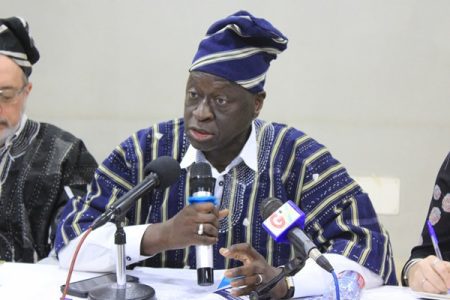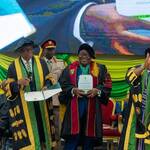The Vice-President of the World Bank for West and Central Africa, Ousmane Diagana, has praised the transformative impact of the Gulf of Guinea Northern Regions Social Cohesion Project (SOCO) on rural communities in northern Ghana.
Describing the initiative as a “game changer,” Mr. Diagana assured of expedited funding to sustain and expand the project to reach more beneficiaries.
SOCO’s reach and objectives
SOCO, a $450 million initiative supported by the World Bank, is being implemented in Ghana, Togo, Benin, and Côte d’Ivoire to promote social cohesion and economic development in vulnerable regions.
On Saturday, January 11, 2025, Mr. Diagana led a delegation, including World Bank Ghana Country Director Robert Taliercio O’Brien and representatives from USAID, UNDP, and UNHCR, to inspect ongoing projects in Ghana’s Northern Region.
Livestock market driving economic growth
The delegation visited the Nangbag-Yapala Livestock Market in the Sagnarigu Municipal Assembly, a project that has revitalized the local economy.
Equipped with modern facilities, including a kraal, holding bay, loading ramp, and administrative offices, the market has become an economic hub.
Data from the Ministry of Local Government, Decentralization, and Rural Development shows that farmers earn an estimated GHS400,000 from cattle sales and GHS100,000 from small ruminants each market day.
The facility, operational since November 3, 2024, fosters vibrant commerce and provides livelihood opportunities for the community.
Support for livelihood initiatives
Other inspected projects included the Daboya Smock Weavers Association and the Shishagu Soap Makers’ Group, comprised of 13 women and two men. These initiatives have fostered social cohesion and empowered local communities.
“I am very satisfied. I have seen concrete activities funded by the project,” Mr. Diagana said, emphasizing the importance of community ownership.
He added, “This sense of ownership is critical, as it ensures sustainability and responsiveness to local needs.”
Growing demand for project expansion
The success of the SOCO initiative has spurred calls for its extension to non-beneficiary communities.
Mr. Diagana acknowledged the rising demand, noting that it reflects the project’s positive impact.
He assured stakeholders of the World Bank’s continued support while urging governments in beneficiary countries to sustain the project.
World Bank Ghana Country Director Robert Taliercio O’Brien highlighted the importance of feedback from local authorities to tailor projects effectively.
Achievements and progress
Samuel Seth Passah, Director for Local Governance and Decentralization, highlighted SOCO’s achievements during an engagement with stakeholders.
“Within two years, the project has impacted 1.5 million people across 1,700 communities in 48 districts, with $60 million disbursed so far,” he said.
Challenges and inclusivity
Despite its successes, the project has faced challenges in engaging minority groups.
SOCO Project Coordinator Elizabeth Ohenewah Agyei emphasized the importance of continuous engagement with these groups to ensure inclusivity and long-term sustainability.
Ms. Agyei also stressed the need for measurable indicators to track the project’s impact and guide future interventions.
“If we cannot measure the changes, we will struggle to determine the next steps,” she explained.
A model for social cohesion and development
The SOCO project’s rapid implementation and visible results underscore its potential as a model for fostering social cohesion and economic development.
With sustained support and strategic expansion, it promises to transform the lives of even more communities in Ghana and the Gulf of Guinea region.
- Military service commanders sworn into Armed Forces Council - 25 April 2025
- Finance Minister unveils plan to tackle 2024 payables - 25 April 2025
- 2 potential flagbearers donate GH¢3m and GH¢1m to NPP - 25 April 2025

